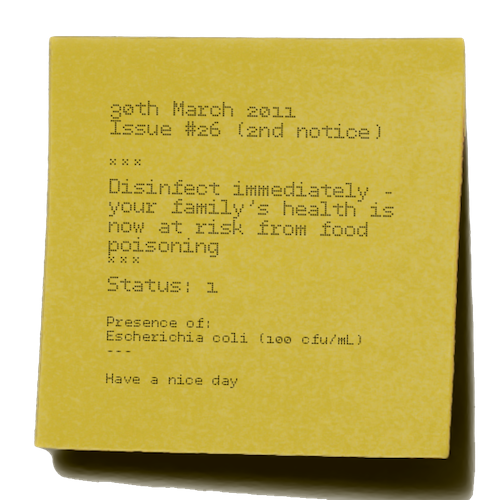Little Help
April 2011film, electronics, improvisation, robotics, rca
film, electronics, improvisation, robotics, rca
Improvised with Thom Tuck and with thanks to Neil Usher and Pei-Ying Lin.
A short film investigating the power relationship between a robot and the householder.

The film introduces Swab-bot, a robot which swabs surfaces and analyses them, then prints and leaves a post-it note informing the human of the actions required. The design recognises that most manual jobs are still the firmly in the human's domain, whilst chemical/particle sensing is something we can easily anticipate robots performing.
Since the beginning of robotics there has been the aspiration for them to act as domestic house-servants. At the World Faire in 1939, Westinghouse's Elektro proclaimed, "if you use me well, I can be your slave". The invariably hyped capabilities of these machines were publicised throughout the 20th century, promising the rapid demise of housework. This continues to this day with devices such as the Roomba, whose usefulness can at least be questioned.
I see the aspiration for domestic robots in the historical context of slaves and domestic servants. Through this lens the function of robots is not merely utilitarian, but also social. To have another subservient to your will establishes your social position, signalling your power and wealth to others.
Mrs Beeton notes in The Book of Household Management (1861), "It is the custom of Society to abuse its servants … Young men at their clubs, also, we are told, like to abuse their fellows, perhaps not without a certain pride and pleasure at the opportunity of intimating that they enjoy such appendages to their state." Abuse at this time was rife and despicably this continues to this day with the exploitation of, often immigrant, workers.
Swab-bot seeks to highlight the complexity of this relationship.
Robot cleaners and the Museum of Me: Intel's vision of the future, Justin McGuirk, On design, The Guardian Newspaper - 24th January 2012.